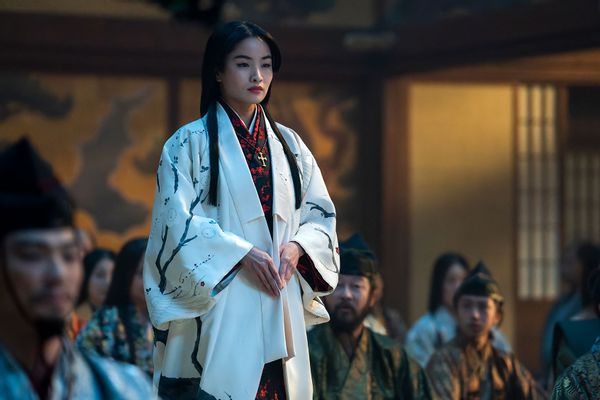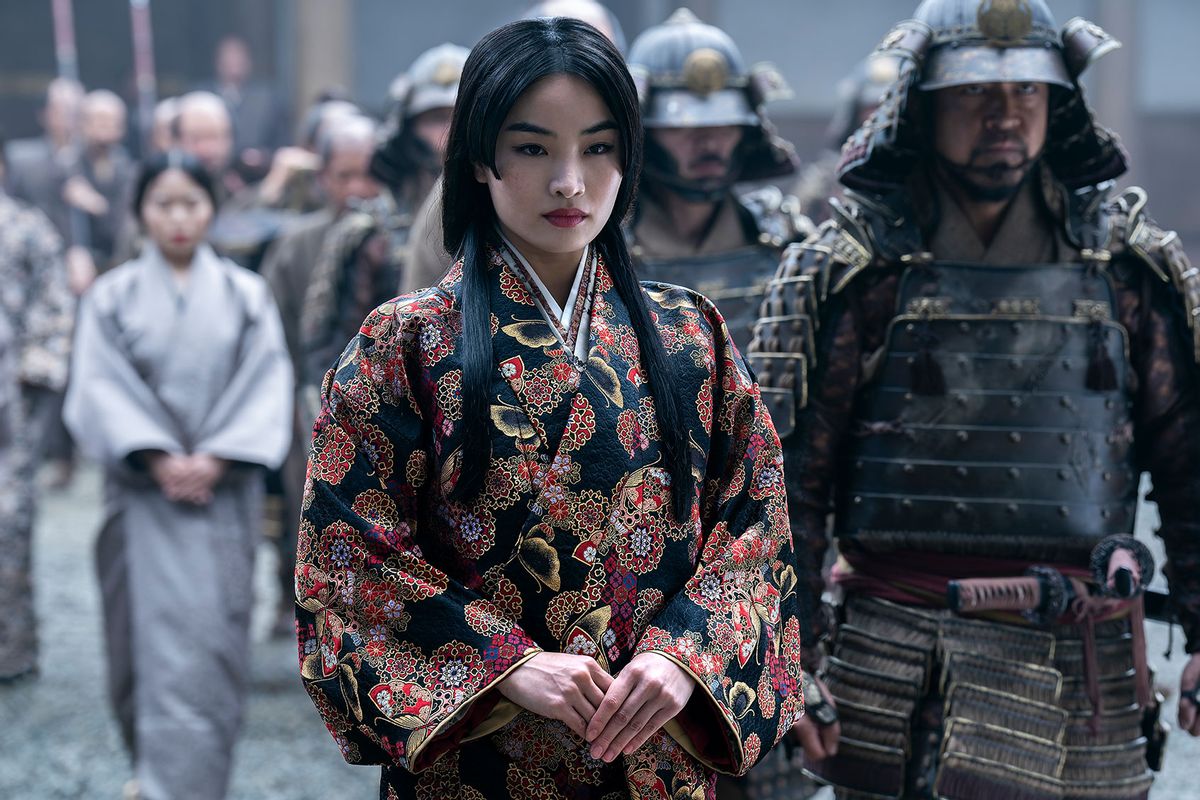At some point last year, Anna Sawai struggled through an existential crisis. Proving that such paroxysms can descend on anyone at any time and anywhere, the 31-year-old recalls being in Hawaii when it hit her.
Regardless of how well her career was going, she says she couldn’t help wondering: “Why? What am I doing? I was away from my family and all alone in Hawaii, and I was like, if I’m not spending time with the people that I love, no matter how beautiful this view is or the good the food is like, it’s nothing.”
Such a malaise is natural for anyone, but Sawai may have been still letting go of Mariko, her doomed noblewoman and the heart and soul of FX’s “Shōgun.”
“It was hard to separate from her at times,” Sawai recalled during a chat that took place in Pasadena before the series premiered. “Even on weekends, I would feel the weight of her . . . It was not always easy. “
In the 1980 adaptation of James Clavell’s novel Mariko’s main attributes are her tragic circumstances and exoticized beauty, both of which draw the author’s white protagonist John Blackthorne to her. The FX version’s creators and showrunners Rachel Kondo and Justin Marks transform that portrait, making Cosmo Jarvis’ Blackthorne far more dependent on Mariko than the other way around.
Sawai demonstrates how a performance made of subtle emotional expression, minimal physical movement, and quietude steadily ramps up to the tour de force that is “Crimson Sky.”
Sawai is accustomed to switching things up in a career that includes a stint in the Japanese pop group FAKY, a supporting part in “Pachinko” and the lead in the “Godzilla” universe series “Monarch: Legacy of Monsters.”
“We didn’t want to tell the story where a white guy comes and saves Mariko.”
Playing Mariko challenged her to set aside her physical versatility to play a character whose expression is primarily internalized, whose movements are restrained and whose expression is stoic, even when her abusive husband fires an arrow that passes so close to her face that it brushes her hair.
Kondo and Marks expand Mariko to make it plain to the audience that most of her restrictions are self-imposed. Mariko is a character who constantly expresses her yearning for death with most of those surrounding her assuming that wish comes from a desire to be freed of her family’s shame.
Sawai’s Mariko is also informed by a life spent in an unhappy marriage, separated from her best friend and thwarted from attaining her greatest potential. She’s highly intelligent, skilled in combat, the equal of any man.
Being born a woman — the daughter of a named traitor no less — freezes her in place.
“Crimson Sky” enables her to finally exercise her strategic prowess, as Mariko travels to Osaka in a scheme concocted by her liege Hiroyuki Sanada’s Lord Toranaga to expose his rival Ishido (Takehiro Hira) for dishonorably taking members of high-ranking families hostage by appearing before him and Ochiba no Kata (Fumi Nikaido), her childhood best friend and mother to the late ruler’s son and heir.
Fumi Mikado as Ochiba no Kata and Anna Sawai as Toda Mariko in “Shogun” (Katie Yu/FX)In their court, and through Sawai, we see her flex an electric might in her stillness, standing in front of a corrupt lord and refusing to accept his disrespect.
“I am no peasant to be trodden on,” Mariko declares without any shame or guilt in her voice. “My line has been samurai for 1,000 years, and I will never be captive, or hostage, or confined. I am free to go as I please, as is anyone.”
This is her first move in a battle of bluffs. First she announces to the court that she’s been ordered to escort Toranaga’s wife and consort home from Osaka. Mariko attempts to leave but watches as her samurai retinue is slaughtered; she swings a naginata attempting to fight through herself only to be pushed back.
“I am no peasant to be trodden on.”
Then she swears that she’ll commit seppuku for failing to comply with her lord’s orders, only to have Ishido relent at the last moment, realizing Mariko’s ritual suicide will create a rebellion among the upper class. Ishido relents to save face, but Mariko’s victory is short-lived. He arranges for shinobi assassins to kill her quietly, only for her to sacrifice her life in an explosion to save everyone around her.
Her fate is similar to Clavell’s original rendering of Mariko, but the new “Shōgun” pulls more influence from the historical figure upon whom Mariko is based: the female samurai Hosokawa Gracia who, like Mariko, was a Catholic convert.
The NBC miniseries painted her as an adulteress. No joke — a commercial describes her as such, which isn’t that far off from how the book portrays other female characters.
When Sawai read Clavell’s 1975 novel, she also found the women to be very sexualized, making her appreciate the 2024 series’ reframing.
Want a daily wrap-up of all the news and commentary Salon has to offer? Subscribe to our morning newsletter, Crash Course.
“We didn’t want to tell the story where a white guy comes and saves Mariko. She doesn’t need anyone to save her. She’s not looking for that,” Sawai adamantly insisted. “She knows her own destiny. And I think that Justin knew that we had to portray her in that way.”
 Anna Sawai as Toda Mariko in “Shogun” (Katie Yu/FX)But Sawai also wants to push back against any reflexive interpretation that the series is implying that powerful women must die in this story, pointing to Ochiba and others as proof that’s not the case.
Anna Sawai as Toda Mariko in “Shogun” (Katie Yu/FX)But Sawai also wants to push back against any reflexive interpretation that the series is implying that powerful women must die in this story, pointing to Ochiba and others as proof that’s not the case.
A meaningful life, Sawai said, does not have to be defined by death but, as Mariko showed, by having a purpose. Realizing that may have sparked a new fear: “I’m scared that I’m not going to find someone as impactful to play as Mariko,” Sawai admitted, “because I gave her my all and I hope that people see the depth in her.”
Based on the widespread acclaim she’s received, that’s not a problem. According to her, though, the reviews of her performance, while appreciated, hold less meaning for her than her hopes for what Mariko and other memorable “Shōgun” characters inspire.
“I want people to reflect on their own life. Really think about it. Because otherwise, you know, you don’t,” she said. Then she laughed before adding, “I mean, maybe people do. But I think it’s a good thing to reflect on.”
New episodes of “Shōgun” stream Tuesdays on Hulu and premiere at 10 p.m. Tuesdays on FX.
Read more
about this topic

